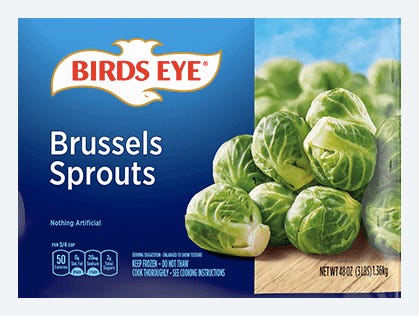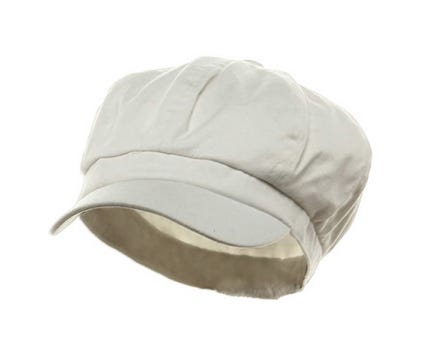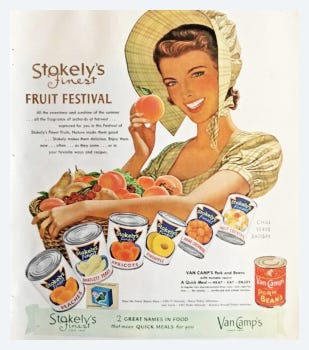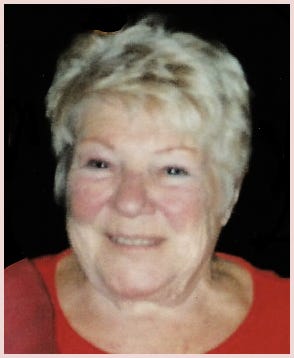Katy and the Brussels Sprouts Girls
Obviously, no one ever heard her say, “God, I love my work.”
The direct quotes in this memoir are from an interview carried out when Katy was 75 years old. They are her words. The tape and transcript of my mother’s voice is a gift of immeasurable value to me, a priceless treasure.
Imagine, if you will, a frozen food plant in the 1970s that processes hundreds of pounds of malodorous Brussels sprouts all day long, five days a week. It’s a cavernous, unheated warehouse-type building with water dripping everywhere from the cleaning, trimming and blanching of these fresh-picked mini cabbages. Imagine long lines of women standing at the conveyor belts, prepping and packing sprouts into folded white paper boxes for freezing, the roar of machinery assaulting the ears. Obviously no one ever heard Katy say, “God, I love my work.”
In that less-than-ideal daily environment, our always-optimistic Katy worked at the head of a long processing line, regulating how fast those Brussels sprouts would be released onto the long conveyor belt. She was positioned up above the conveyor line to be able to watch the girls closely — were they keeping up, or did she need to slow down the feeder? Basically, she had to run her line fast enough to keep the eagle-eyed foreman happy, but slow enough for the line girls to have time to cull out the damaged sprouts, sort them by size, trim them, and pack them in the little boxes without being overwhelmed. If Katy ran her line too fast, sprouts would start falling off the end of the conveyor and onto the floor, which, as you might suspect, was not a good thing. The little boxes of sprouts continued their journey down the conveyor to be wrapped in printed Birds-Eye brand waxed paper and then carried on pallets by forklift to the freezers.
“There were three lines running at once and we had a little competition to see which line could pack the most boxes every day. The winning line got bonus pay, so we all really did our best. All the girls wanted to work on my line as I always went easy on them and at the same time I shouted out encouragement — you know, like a football coach. We were winners of the bonus pay a lot. It helped to raise our spirits and feel more like a team.”
The women who worked under this pressure, were of various backgrounds, including many Italian, Mexican, Portuguese, and Filipino women. They were aged 17 to 60, and some were second generation sprout packers, mothers and daughters working side by side.
“Oh, yes! We were on our feet for 8 hours a day. We had to tuck our hair under these ugly brown hair nets, and we had to wear big plastic aprons to protect our clothes and rubber boots to keep our aching feet dry. We didn’t look too good, I’ll tell you, but we just laughed about it. There was a lot of joking and teasing on the lines and we made some pretty good friends. I was with some of those same women for over twenty years in the 1960s and 70s.”
At the end of the week, some of the women would stop off at Puccinelli’s Bar on Pacific Avenue to have a drink together before going home. No one in the bar had to look up to know who was coming in the door; the frozen food women blew in with that pungent Eau de Brussels Sprouts fragrance. But smelly or not, they were steady customers and were always made welcome. And, come to think of it, they were probably a good match for the odiferous old Italian fishermen who also frequented the place.
“I was a pretty good seamstress in those days, and one year, at Christmas, I got it in my head to sew a hat for every woman on my line. I made 22 white newsboy caps. Oh, they all loved those caps and wore them to the plant’s holiday party. And then they wore them to the Friday evening happy hours at Puccinelli’s. It was like a symbol, I guess, for a bunch of women Teamsters.”
“I remember, too, one season, when the sprout crops were ruined because of all the rain or something, and the plant had to switch to spinach that season. They cleaned and blanched the spinach and sent it down the conveyor belt where we *girls packed it into those same little white paper boxes. We had to weigh each box and either add or take out a few ounces of spinach from the boxes to make them all the same weight. Then the machine wrapped and sealed them with Birds Eye waxed paper. I worked down on the floor that whole season, so I really got my hands into that spinach. I didn’t like it.”
Katy told me that after that anomalous season, she never ate frozen spinach again. She knew first hand about the bugs and spiders accidentally packed into the boxes with the spinach and she was having none of it.
One year, on Katy’s birthday, a van from a local flower shop pulled up in front of the loading dock at break time, and carried a large box of flowers inside for someone named Katy. “Me?” she squeaked, as everyone watched. Two dozen yellow roses were in the box with a card that said “Happy Birthday, sweetheart, with much love from your Sidney.”
“All the girls knew that my husband’s name was Ben, and they were dying to know who this Sidney guy was. I just smiled and would not tell them who he was. And I never did tell them either!”
In truth, I, myself, had sent the flowers to her as a surprise. Sidney was my cat. I did that once a year for several years to keep the speculation going. Katy loved it.
Her entire adult life Katy lived in Santa Cruz, which is just a few miles west of two of California’s major agricultural areas — Watsonville and Salinas. All of her work was in food processing and packing. She worked a couple of years at one of the many apple sheds in Watsonville where she cleaned and pared Pippins and Gravensteins and spread them on frames to dry. Later she worked the night shift canning pears at Stokely’s in Santa Cruz. Each afternoon she would walk three miles to work along the railroad track as she had no car.
After seven hours of stuffing cooked pears in cans, she would walk the three miles back home alone at midnight along those tracks. Her long white plastic apron, the hair net, the rubber gloves and boots were sticky with pear juice and she had to wash them thoroughly every night before going to bed to prepare for the next day.
Those Stokely girls were on their feet all day, up to their elbows in pear juice, trying to keep up with the conveyor belt. There always seemed to be true camaraderie and good-spirited banter, though, to counteract the grueling work. My sister-in-law, Susan, who also worked canning pears for a couple of seasons, shared with me this memory of Stokely’s:
“The Italian women who worked there were very kind to me and would invite me to sit with them at lunch break — it was a real ladies social club. They’d tear off sheets of paper towels for placemats and always brought in flowers to put in the tin cans to brighten up the drab lunch room. They were strong women who knew how to work hard but still find humor. I’ll never forget the conveyor belt and the smell of pears coming down the line after having run through a lye bath to remove the skins. Our job was to pick up each pear half, inspect it and scrape off any skins remaining before being sent to be canned in steam baths. The steam, the pressure, the rattling cans, the noise – it was not uncommon that women on the line would pass out and fall over backwards! I couldn’t stand the smell of pears for years after. It was good money though and seasonal work.”
She was a worker, our Katy, and she stuck with food packing for twenty-five years. Still, even while working five days a week, she managed to raise two normal kids ( well, I am normal — not too sure about my brother), and she saw us both successfully finish school, all while having to cope with an alcoholic husband. Though our life was a little sketchy to say the least, we always knew how hard she worked to sustain us. She loved us fiercely, and we adored her. That love and her strength were the saving grace of all of us.
NB: In that era, women called themselves “girls”. I honor that here.
Katy had a remarkable life. More Katy stories are here: THE KATY MEMOIR










Sharron, Thank you for sharing more stories from your mother's life. Your mom Katy inspires by the force of her character, strength and ability to adapt to life's challenges. Even though I have lived for decades in this agricultural state, I have never before read any description in fact or fiction of what it really takes to put brussel sprouts, frozen spinach, or canned pears on the nation's table. You made your mom's grueling work vivid. It is a privilege to read your tribute to her. -Marina
A really well told story. That whole region is alluring and reminds me of Steinbeck.